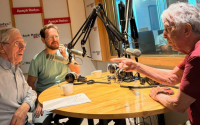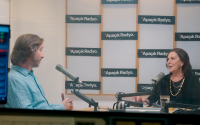28 August 2007Yahoo! NewsOlivier Knox
President George W. Bush will portray Iraq Tuesday as the front-line against Islamist extremists, singling out Al-Qaeda's Sunni Muslim insurgents and Iran-backed Shiite fighters, aides said.
Bush was to plead for patience with the unpopular war in a speech to the American legion veterans group, the second of two presidential addresses ahead of a critical mid-September progress report on the conflict.
The US commander in Iraq, General David Petraeus, and the US ambassador to Baghdad, Ryan Crocker, are due to testify to the US Congress the week of September 10 ahead of a formal White House assessment for lawmakers.
Bush, under mounting pressure to withdraw US troops from Iraq, was to use his speech here to argue that a hasty departure would embolden extremists who threaten the Middle East and may be plotting to attack the United States.
"The president will talk about Sunni extremism and Shiite extremism. Neither represents Islam. They represent a brutal and heartless ideology of death and destruction," a senior aide told reporters in a preview of the speech.
"Sunni extremism is embodied by Al-Qaeda and its many affiliates. Shiite extremism by Iran and its support of Hezbollah, Hamas, the Taliban and its pursuit of nuclear technology," the official said on condition of anonymity.
"Iraq is at the heart of where these two extremisms must be dealt with," the official said.
Bush, who recently accused his critics of wanting to "pull the rug" from under US forces on the front lines, has insisted that the war-weary US public is not getting the good news from Iraq.
"You know, when they open up a new school in Iraq it doesn't make headline news. When Al-Qaeda kills a bunch of people, it does. And these folks are trying to shake our will," he said at a political fundraiser on Monday.
Bush also offered measured optimism about a broadbrush deal among top Iraqi leaders to forge national unity and quell sectarian violence but warned officials in Baghdad that "much more needs to be done."
He spoke after Sunni Arab politicians refused to end their boycott of Iraq's Shiite-led government on Monday despite the deal.
Bush ordered 30,000 more US troops to Iraq in January in order to give politicians there a respite from violence and time to work out elusive compromises on legislation seen as key to forging national unity.
"Our men and women in uniform have performed their duties excellently, but the purpose of the escalation in Iraq was to create a secure environment in which political change could occur, and it is clear that the Iraqi leaders have failed to make progress," Democratic House Speaker Nancy Pelosi said.
"We need a New Direction to bring our troops home from Iraq so that America can refocus its efforts against terrorism worldwide," she said in a statement before the speech.
More than four million Iraqis have fled their homes because of sectarian violence, the largest population movement in the Middle East since Palestinians left the new state of Israel, the United Nations refugee agency said Tuesday.
Bush's speech came as firefights between police and gunmen killed at least 27 people during a huge Shiite pilgrimage to the Iraqi shrine city of Karbala, sending devotees fleeing in panic.
The clashes come at a time when Iraq is battling a brutal sectarian conflict and a raging insurgency that has killed tens of thousands of people since early last year.
Battles broke out in early afternoon and were continuing at sunset, when three hotels could be seen burning, while smoke was billowing from around the mausoleum of Imam Hussein, one of Shiite Islam's holiest shrines.






